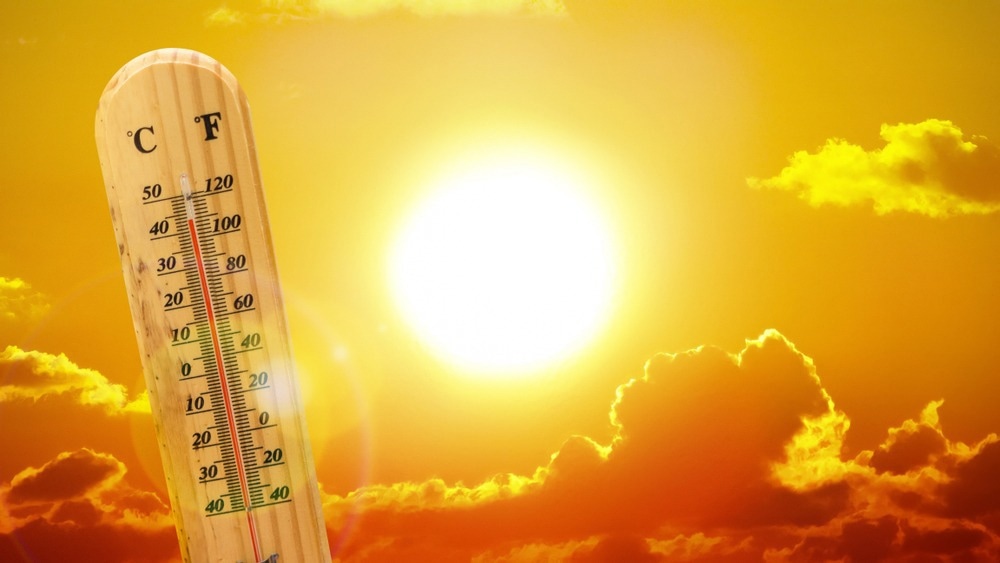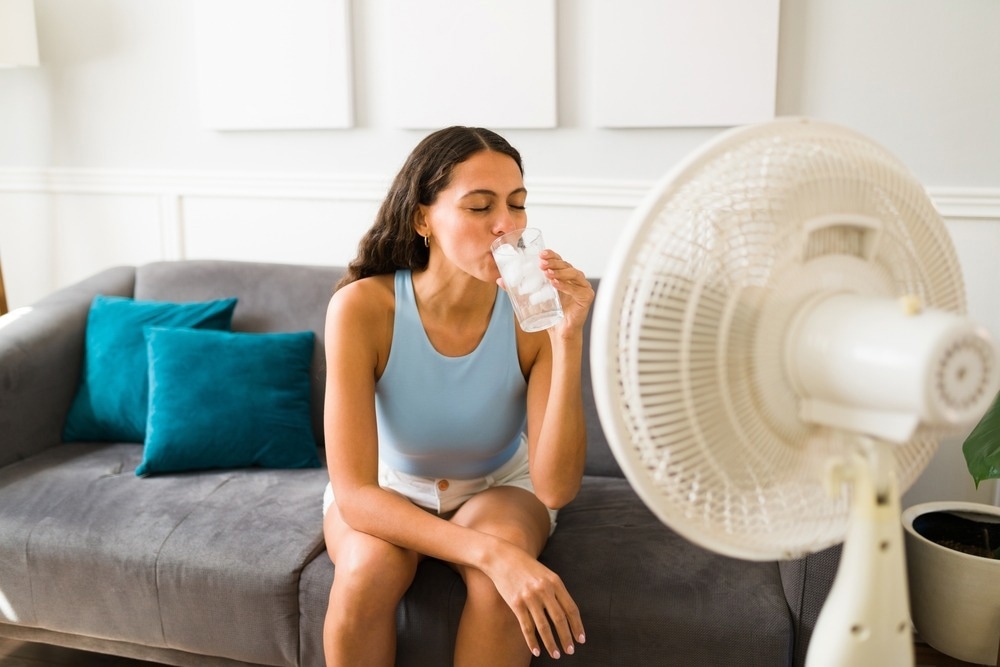Introduction
What are heat waves?
How will these heat waves impact human health?
The biology behind heat-related afflictions
How growing heat waves have affected land and sea
References
Since we first began recording global temperatures in the early 80s, we have unveiled an unprecedented and continuous rising in the earth's temperature. This trend does not show signs of halting, and future heat waves will become more frequent in direct correlation. This is apparent, with the warmest summers ever recorded transpiring in the last decade or so. In addition, these heat waves will have a prolonged duration and higher maximums than ever recorded.

Image Credit: Ed Connor/Shutterstock.com
What are heat waves?
A heatwave is a prolonged period of unnaturally high temperature triggered by increased atmospheric pressure within a specified area. Within this expanse, excessive pressure begins to draw air from the upper atmosphere; this air will condense and begin to warm. This phenomenon will trigger a domino pattern, whereby cloud shading will be blocked, and wind patterns will be hindered, allowing the sun's heat to impact these stagnant conditions further.
Meteorologists and other weather scientists estimate that the duration of these heat waves will increase, spanning from late spring and ending as late as the beginning of fall. All data accrued shows that the extreme heat waves of the early 21st century will become the norm in the latter half of the 21st century. This will not only impact the wildlife and animal stocks but also spell out dire health crises for the future populace.
How will these heat waves impact human health?
It has been shown that instances of disease and bodily illnesses will increase during heat waves. Among these are afflictions like heat-stroke-related mortality. Surges in "death by heatstroke" are becoming more notable, with prominent cases like the Japan and Canada heat-related deaths in July 2018 or the 2021 losses occurring in the US Pacific north-west. These heat-related illnesses are even more concentrated in urbanized areas, where most human beings live.
It is estimated that 700 deaths occur yearly because of heat waves, and adverse health effects will only increase in the coming years. In 2021 extreme heat conditions persisted in Oregon, Idaho, and Washington, reaching temperatures of 116°F (46.7°C). The national weather service concluded that all inhabitants should remain indoors and that merely sauntering outside would be considered dangerous.
Metropolitan areas are more prone to intense heat because of the "urban heat island effect". This results when asphalt stores heat all day, releasing it only at night, inhibiting the surrounding environment from cooling naturally. Not only will this affect heat-related mortality, but it will also increase energy costs and levels of air pollution.
The biology behind heat-related afflictions
When a person experiences heatstroke, water loss peaks, and homeostasis becomes strained. As water becomes depleted, blood will become thicker, leading to a staggering drop in oxygen availability. In a vain attempt to pump more blood to compensate for this lack of oxygen, the heart rate will increase, heating the body even more. This cycle eventually spirals out of control and can lead to death if the individual cannot immediately seek medical attention. This will occur at temperatures that fluctuate above 40oC (104oF).
The proteins in cell membranes will denature at a subcellular level. They will cease to function entirely and leak- this includes cytoplasm, cellular machinery, and all remaining contents. This occurs due to an inflammation response followed by necrosis. Traditionally, necrosis results from harsh physiochemical stimuli, but it can be triggered by abrupt changes in temperature, pH, or osmotic pressure. Symptoms of this phenomenon include liver damage, blood clots, and failure of vital organs. Physical symptoms include fainting, cramping, and more.

Image Credit: antoniodiaz/Shutterstock.com
How growing heat waves have affected land and sea
Extreme climatic events are increasing because of the overall rise in global temperature. These include droughts, floods, and heat waves. Data collection from the Indian metrological department allowed (Omid Mazdiyasni et al.) to analyze heat-related mortality in India between 1960 and 2009. With a mean temperature increase of 0.5oC over these years, a 146% increase in heat-related mortalities resulted.
Probabilistic metrological forecasts suggest that these numbers will follow this warming trend and mark lower latitude locations like India, Portugal, northern Australia, and many others. Excluding lower latitude countries, locations like Canada and Japan are similarly affected.
Though entire ecosystems have gone undone with warming such as this, one would still see a dire outcome if the scope were solely human health. A higher mortality rate of marine life has transpired over the early 21st century, supporting evidence of increased metabolic demands of ectothermic sea life. Heatwave-triggered nutrition jeopardization has been noted in the northern hemisphere's Gulf of Alaska, Norway, and other colder regions. The 2014-2016 heatwaves demonstrated a decrease in the bioactivity and population of Pacific cod and crab.
With the cold water ecosystem being reformed in a radical fashion, a decrease in trophic transfer energy is notable (Gaichas et al., 2015). Zooplankton, microplankton, and even larger crustacean zooplankton that are less-lipid rich are propagating more and more, favoring the warmer climate. This will consequently jeopardize the latter steps in the food chain, decreasing the energy and bioactivity of fish, affecting humans the most. Though this is only one segment of food production, at least 3 billion people rely on fish for up to 20 percent of their average protein consumption.
References:
- Schramm PJ, Vaidyanathan A, Radhakrishnan L, Gates A, Hartnett K, Breysse P. Heat-Related Emergency Department Visits During the Northwestern Heat Wave - United States, June 2021. MMWR Morb Mortal Wkly Rep. 2021 Jul 23;70(29):1020-1021. doi: 10.15585/mmwr.mm7029e1. Erratum in: MMWR Morb Mortal Wkly Rep. 2021 Aug 13;70(32):1103. PMID: 34292925; PMCID: PMC8297695.
- Stillman JH. Heat Waves, the New Normal: Summertime Temperature Extremes Will Impact Animals, Ecosystems, and Human Communities. Physiology (Bethesda). 2019 Mar 1;34(2):86-100. doi: 10.1152/physiol.00040.2018. PMID: 30724132.
- Williams CM, Buckley LB, Sheldon KS, Vickers M, Pörtner HO, Dowd WW, Gunderson AR, Marshall KE, Stillman JH. Biological Impacts of Thermal Extremes: Mechanisms and Costs of Functional Responses Matter. Integr Comp Biol. 2016 Jul;56(1):73-84. doi: 10.1093/icb/icw013. Epub 2016 Jun 1. PMID: 27252194.
- Guo Y, Gasparrini A, Li S, Sera F, Vicedo-Cabrera AM, de Sousa Zanotti Stagliorio Coelho M, Saldiva PHN, Lavigne E, Tawatsupa B, Punnasiri K, Overcenco A, Correa PM, Ortega NV, Kan H, Osorio S, Jaakkola JJK, Ryti NRI, Goodman PG, Zeka A, Michelozzi P, Scortichini M, Hashizume M, Honda Y, Seposo X, Kim H, Tobias A, Íñiguez C, Forsberg B, Åström DO, Guo YL, Chen BY, Zanobetti A, Schwartz J, Dang TN, Van DD, Bell ML, Armstrong B, Ebi KL, Tong S. Quantifying excess deaths related to heatwaves under climate change scenarios: A multicountry time series modelling study. PLoS Med. 2018 Jul 31;15(7):e1002629. doi: 10.1371/journal.pmed.1002629. PMID: 30063714; PMCID: PMC6067704.
- Chen, L., Deng, H., Cui, H., Fang, J., Zuo, Z., Deng, J., Li, Y., Wang, X., & Zhao, L. (2017). Inflammatory responses and inflammation-associated diseases in organs. Oncotarget, 9(6), 7204–7218. https://doi.org/10.18632/oncotarget.23208
- Proskuryakov SY, Konoplyannikov AG, Gabai VL. Necrosis: a specific form of programmed cell death? Exp Cell Res. 2003 Feb 1;283(1):1-16. doi: 10.1016/s0014-4827(02)00027-7. PMID: 12565815.
- Gaichas, S., Aydin, K., and Francis, R. C. (2015). Wasp waist or beer belly? Modeling food web structure and energetic control in Alaskan marine ecosystems, with implications for fishing and environmental forcing. Prog. Oceanogr. 138, 1–17. doi: 10.1016/j.pocean.2015.09.010
- Aydin, K., Gaichas, S., Ortiz, I., Kinzey, D., and Friday, N. (2007). A Comparison of the Bering Sea, Gulf of Alaska, and Aleutian Islands Large Marine Ecosystems Through Food Web Modeling. U.S. Dep. Commer., NOAA Tech. Memo. NMFS-AFSC-178, 298
- Committee on a Framework for Assessing the Health, Environmental, and Social Effects of the Food System; Food and Nutrition Board; Board on Agriculture and Natural Resources; Institute of Medicine; National Research Council; Nesheim MC, Oria M, Yih PT, editors. A Framework for Assessing Effects of the Food System. Washington (DC): National Academies Press (US); 2015 Jun 17. ANNEX 1, DIETARY RECOMMENDATIONS FOR FISH CONSUMPTION. Available from:
- Heaviside C, Macintyre H, Vardoulakis S. The Urban Heat Island: Implications for Health in a Changing Environment. Curr Environ Health Rep. 2017 Sep;4(3):296-305. doi: 10.1007/s40572-017-0150-3. PMID: 28695487.
Last Updated: Jul 12, 2022